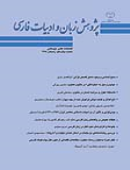استعارة دستوری: شاخصی نو در تمایز زبان ادب و علم
محورهای موضوعی : پژوهشهای ادبیات کلاسیک ایرانحسین رضویان 1 , ساجده مبارکی 2
1 -
2 -
کلید واژه: متون علمی متون ادبی دستور نقشگرای نظاممند هالیدی استعارة دستوری,
چکیده مقاله :
یکی از مفاهیم مطرح در دستور نقش گرای نظاممند هالیدی، استعارة دستوری است که نوعی از استعاره معرفی شده است. هالیدی سه نوع استعارة دستوری - اندیشگانی، بینافردی و متنی- را معرفی و متمایز کرده است. هدف این مقاله، بررسی میزان و شیوة کاربرد انواع استعارة دستوری در متون ادبی و علمی است. بدین منظور نویسندگان یک اثر علمی با عنوان «درآمدی بر جامعهشناسی زبان» نوشتة یحیی مدرسی و یک اثر ادبی با عنوان «تنگسیر» نوشتة صادق چوبک را برای نمونه انتخاب و تجزیه و تحلیل کرده اند. نتایج به دست آمده بیانگر آن است که میزان استفاده از انواع استعارة دستوری در متون علمی و ادبی یکسان نیست. به نظر میرسد که نویسندة متون علمی برای غنی سازی محتوای عبارات، فشرده کردن اطلاعات، تخصصی ساختن متن برای مخاطب مخصوص خود، گویاتر ساختن مطالب و دلایل دیگر از استعارة دستوری استفاده کرده است. در مقابل نویسندة متن ادبی، استعارة دستوری را بسیار کم به کار برده است. دلایل یادشده دربارۀ متون ادبی صادق نیست و کاربرد اندک آن را موجه می سازد. بنابراین مقاله با ارائۀ شواهد کافی از دو متن تلاش دارد تا استعارة دستوری را به عنوان یک شاخص برای تمایز متون علمی و متون ادبی معرفی کند.
One of the common concepts in systemic functional grammar of Michael Halliday is grammatical metaphor, generally introduced as a kind of metaphor. Halliday introduced and distinguished three grammatical metaphors: ideational, interpersonal and textual. This article reviewed the degree and method of applying different kinds of grammatical metaphors in scientific and literary texts. To do so, authors selected and analyzed one scientific work titled “an Introduction to Sociology of Language” by Yahya Modarresi and one literary text named “Tangsir” by Sadeq Chubak as their samples. Their findings showed that the degree of using different kinds of grammatical metaphors is not equal in scientific and literary texts. It seems that authors of scientific texts used grammatical metaphors to enrich contents, information summarization, making texts more technical for target audiences, making contents clearer and other reasons. The author of literary text used grammatical metaphors as few as possible. Abovementioned reasons do not apply in literary texts and this justifies its less usage. Therefore, the article attempts to introduce grammatical metaphor as a new criterion for distinguishing scientific and literary texts by providing enough proofs from these two texts.


